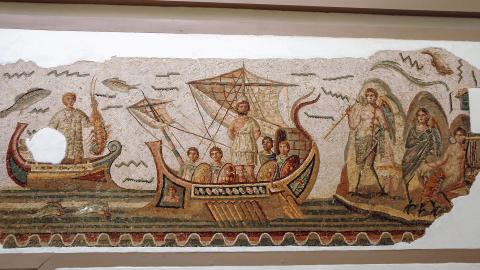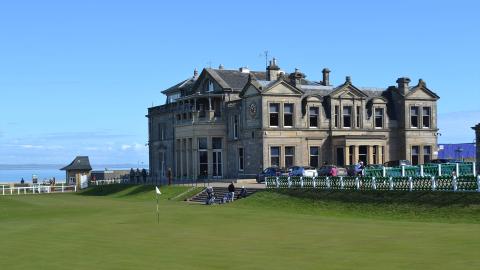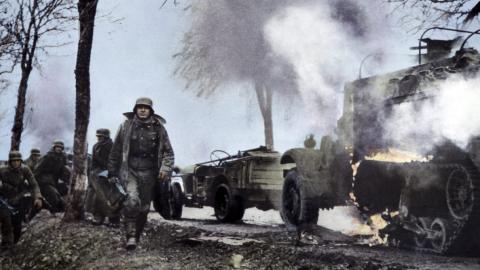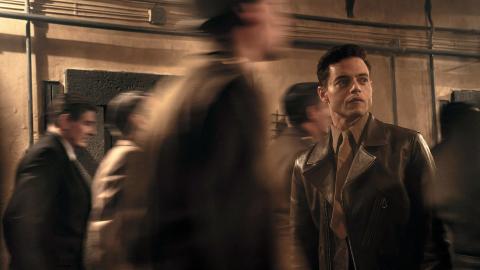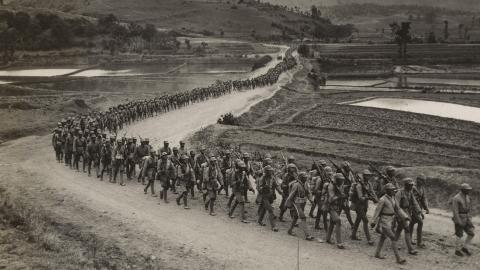Monty's Eighth Army and the North African campaign of World War II
Weedon Bec in Northamptonshire may seem like a rather unassuming little place. The kind of quaint little village where you might potentially potter about a farm shop, have an ale in a pub, or – if you really wanted to feel edgy – walk up the occasional hill.
Except that, as Suggs and Stephen Taylor find out in episode 2 of WW2 Treasure Hunters, Weedon Bec does have a rather exciting secret. It was once home to a depot which was the starting point of one of the biggest supply chains in British military history. It was from here that millions of the most famous guns ever used by the army – including the bolt-action Lee-Enfield rifles and the iconic STEN submachine guns – were shipped out to where they were most needed in the conflict against the enemy in World War Two.
This epic supply chain played a decisive role in the victory against the Axis powers in North Africa, where Monty (aka the cocky, headstrong Field Marshal Bernard Law Montgomery) played a deadly military game against the Desert Fox (aka the cocky, headstrong Erwin Rommel).
The Italian Job
The situation in North Africa was already what kids today would call a 'hot mess' long before Monty and Rommel turned up. In June 1940, Benito Mussolini – after years of blustering, strutting and procrastinating – finally joined the war.
With Hitler apparently winning in Europe, Mussolini thought this the perfect time to expand his existing colonies in Africa, such as Italian Libya. Unfortunately for Il Duce, the task he set in Africa was easier said than done. Just across the border of Italian Libya lay Egypt, which was effectively controlled and protected by the Allies. They jealously guarded the Suez Canal, a crucial pathway for supplies and communications to the Middle East.
The Brits in Egypt boldly invaded Italian Libya first, setting into motion a tug-of-war with the Italians counter-attacking and pushing into Egypt, and the British then counter-counter-attacking with maximum force, eventually crushing the Italian 10th Army. The Germans had to be called in to bail the Italians out. Enter: Erwin Rommel.
Out-foxing the Fox
Hitler adored Rommel, but historians still debate how much this affection was reciprocated by Rommel. Some maintain Rommel was one of the 'good Germans' of the war, a chivalrous military hero who never bought into racist Nazi ideology. Others argue he was a proud tool of a vicious regime who shouldn’t be let off the hook just because of his glamorous exploits in Africa.
Either way, he certainly shook things up when he arrived in Libya to lead the newly-formed Afrika Korps against the Allies. Impulsive and aggressive, he instigated the Siege of Tobruk in 1941 – an attempt to take the fortified port city of Tobruk which lasted 241 hellish days. The Allied garrison held out in Tobruk, despite the squalid, sticky, flea-infested conditions, proudly calling themselves the 'Rats of Tobruk'.
The siege was finally relieved by Operation Crusader, in which Rommel’s forces were pushed back by the Eighth Army – a diverse new force which included soldiers from Australia, South Africa, New Zealand and India.
Churchill said of Monty: 'In defeat, unbeatable; in victory, unbearable.'
The Eighth Army would become legendary under the later leadership of Bernard Law Montgomery, a prickly, paradoxical figure who was loved and loathed in equal measure. Churchill said of Monty: 'In defeat, unbeatable; in victory, unbearable.' (While he certainly had an ego, Monty also had a sense of humour, owning a pair of puppies called Hitler and Rommel.)
Monty and Rommel’s most decisive confrontation was the Second Battle of El Alamein in Egypt, which ran from October through to November of 1942. Monty’s troops were well supplied with a vast array of tanks, including the new M4 Sherman tanks, as well as shipments of powerful 6-pounder anti-tank guns. In one skirmish alone during the battle, more than 15 enemy tanks were destroyed by these guns. All in all, the Allies had a huge trump card in the form of their intact supply route, while Rommel had over-extended his supply lines and was feeling the pinch.
El Alamein was an inferno, beginning with an almighty, WW1-style artillery bombardment by Monty which one soldier described as turning the entire horizon into a 'fount of orange and blood-red flame, stabbing at the sky'. Out of the horror, came a victory for the Eighth Army that changed the face of the North Africa campaign.
Churchill famously said, 'Before Alamein, we never had a victory. After Alamein, we never had a defeat'. Though Rommel retreated to battle on in Tunisia, this was the watershed moment for the Allies and a huge morale boost for the Allies.
The Eighth Army would later leave Africa behind to participate in the invasion of Sicily in the summer of 1943, while Rommel too became involved in the Italian campaign. However, his career, which had been so celebrated by the Nazi propaganda machine, came to a dark end. Implicated in the 'Operation Valkyrie' plot to assassinate Hitler (although he was probably only vaguely aware of it), Rommel was arrested and given a choice: face a kangaroo court and be disgraced, or commit suicide and be buried with full military honours.
He took the latter option. With a dose of cyanide, the life of one of the most controversial leaders in military history came to an end. As for Monty, he lived on long after the war, and his personal reputation has since been somewhat tarnished by revelations that he was a fierce supporter of Apartheid in South Africa, and was dead against the legalisation of homosexuality ('this sort of thing may be tolerated by the French, but we're British – thank God'). Yet the victory of El Alamein is still ranked by some right up there with Trafalgar and the Battle of Britain, and the adventures of Monty’s men, made possible by those all-important supply routes from Weedon Bec, remain the stuff of wartime legend.



